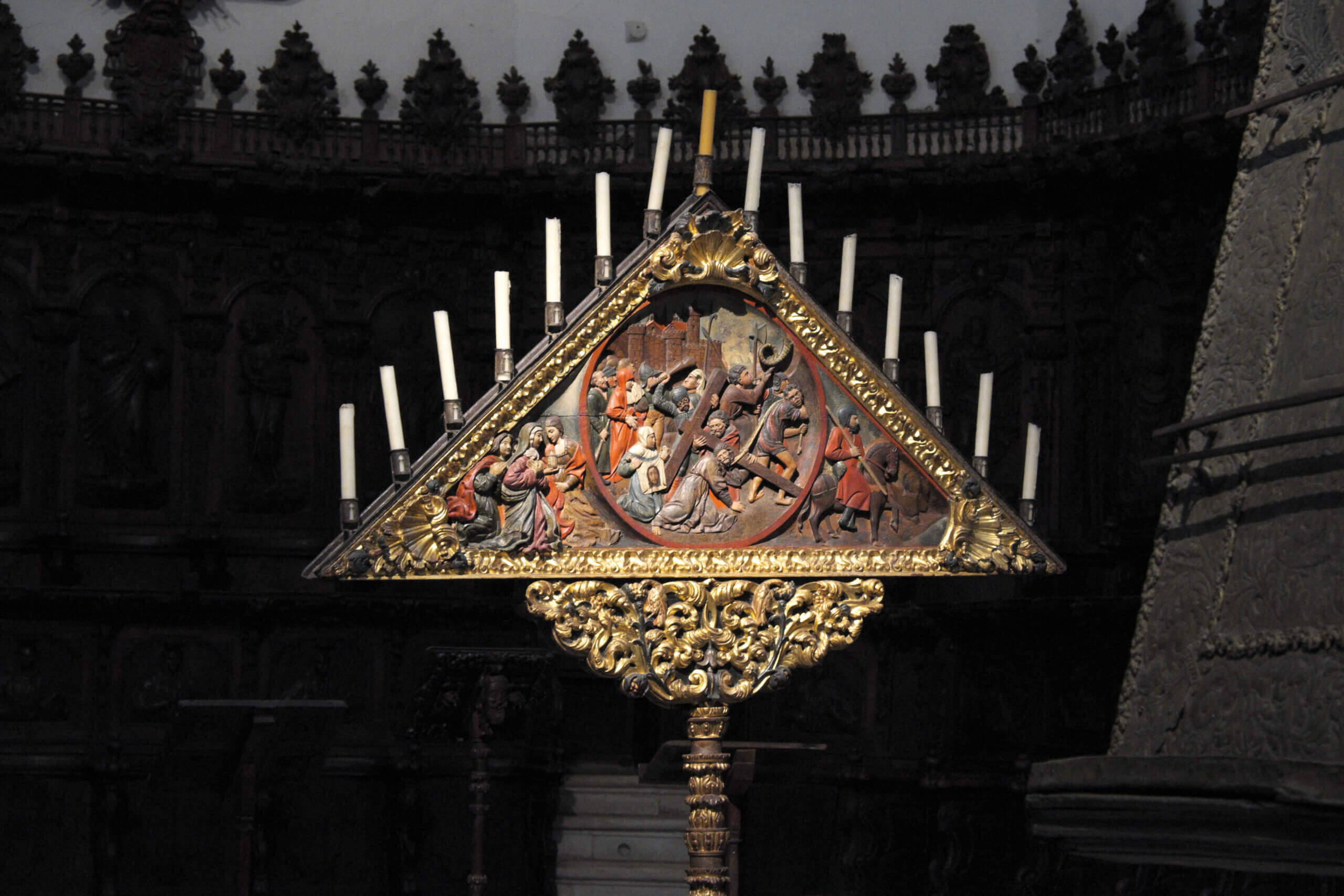Above: Tenebrarium from monastery church of the Real Monasterio de Nuestra Señora de Guadalupe in Guadalupe Extremadura, Spain.
The ceremonies of Holy Week have always been a central moment in the liturgical life of the Church and music has always been a fundamental part of it. Unfortunately, much of this heritage has been lost, in some churches the singing of the Tantum ergo survives on Holy Thursday, but it is practically the last remaining vestige of a time when music was not a filler, but helped to solemnize the liturgy and make it more intense. A liturgically very progressive Cardinal was heard recently expressing his regret about the responsories that were sung during Holy Week.
Yes, the responsories! These beautiful texts that graphically described the phases of the Lord’s Passion: Tristis est anima mea, Iudas mercator pessimus, Tenebrae factae sunt…how much beauty in these sentences, how much spiritual density.
Yet today the office of Tenebrae, in the renewed liturgy, is practically non-existent. It would be enough to talk to those participating in the new liturgy and ask how many of them have ever attended an office of Tenebrae and I believe the answer would speak for itself.
But the problem does not only concern the office of Tenebrae, but also the celebrations themselves on Thursday, Friday and Holy Saturday. How much has been taken away from the possibilities that music would offer to chase after vain ideological chimeras (which in the end prove to be a real catastrophe)? This loss leads us to the sloppy and hasty liturgies we are witnessing today. What has been the result of this loss? It doesn’t seem to me that giving up all of that helped bring people back to church. Not singing Popule meus or Crux fidelis on Good Friday has not contributed to edifying anyone, on the contrary, the faithful have been deprived of a great spiritual treasure.
When it comes to reform in sacred music, what should have happened was this: let’s create new repertoires for new liturgical needs that do not disfigure the face of the musical tradition of the Church which, as it happens, is praised highly by Vatican II itself:
The musical tradition of the universal Church is a treasure of inestimable value, greater even than that of any other art. The main reason for this pre-eminence is that, as sacred song united to the words, it forms a necessary or integral part of the solemn liturgy (Sacrosanctum Concilium, 112).
This is why I have attempted in my career to produce sacred music which is both traditional and modern. We must produce new music while venerating and promoting what has been preserved and passed down to us. But is this really the situation we are in? The answer is in everyone’s ears. That sound and symbolic world has been lost for what? It is really sad to think of the low level we have now reached.
But returning to the creation of new repertoires: there have been and there are very good musicians who have composed for the new liturgy and their compositions are musically very dignified (for example, from my fellow OnePeterFive columnist Massimo Scapin). But why is it very difficult for these compositions, even on vernacular text, to be heard in Masses in our parishes? Because unless truly musically trained people are allowed to take charge of sacred music, those compositions will almost always be beyond the means of the amateurs (not good amateurs, though) who are entrusted with our ears and the corruption of our souls.
When we get to Holy Week, the sense of loss and lack is felt even more acutely and we spontaneously say in our hearts with Psalm 137: how can we sing the songs of the Lord in a foreign land? Another unanswered question.
Thank God, at least these compositions are preserved on the internet for all the faithful to here. May we be found worthy to hear this sacred music once again in our parishes and again during this most sacred time.
Editor’s note: the following is one of the most famous pieces of Sacred Music from Tenebrae.


